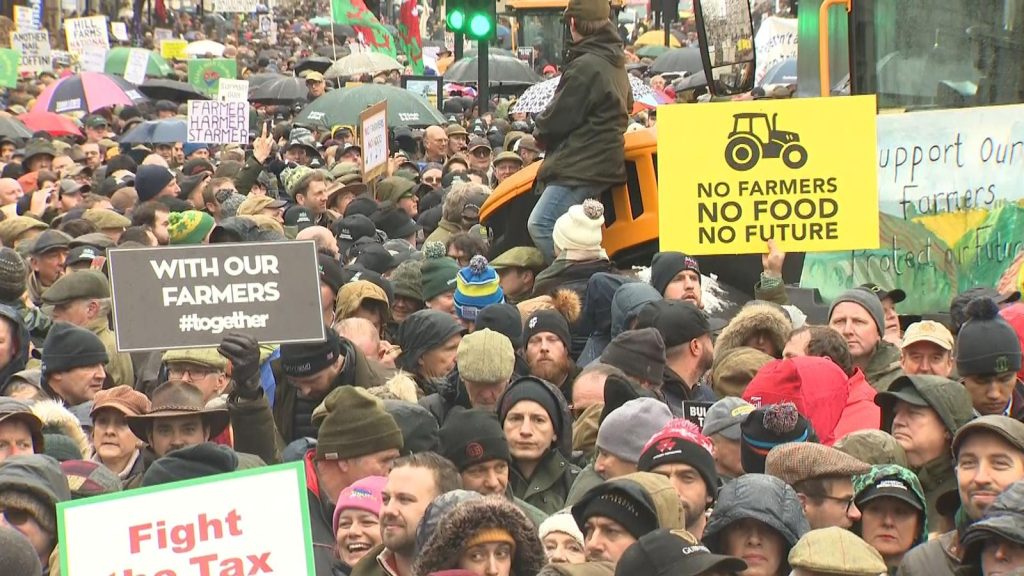What the farmers’ protest tells us about their argument with the government
3 min read
Farmers gathered in central London in protest over inheritance tax changes.

Farmers gathered in central London in protest over inheritance tax changes.
The farmers’ protest outside Parliament was powerfully illustrated by two images: real tractors driven by farmers circling around Parliament Square, and toy tractors being pushed by their children nearby. These images highlighted the core of the farmers’ argument: a deep-rooted cultural expectation that farms will be passed down to the next generation.
For many farmers, this is not just a matter of business but of heritage. It’s a sense of responsibility passed down through family lines, where the expectation is that what their ancestors built, they will continue for their children. The weight of this tradition runs deep in the farming community, where many feel a powerful duty to preserve their family’s legacy, extending their sense of identity and geographical connection to the land.
As a journalist, I’ve had the privilege of covering protests at Westminster for two decades, witnessing firsthand the passionate demonstrations that reflect the heart of our democracy. Protests are essential forums for public voices, allowing people to express their frustrations and engage in public discourse with the government. They provide a unique insight into not only what people believe, but also why they hold those beliefs.
Attending the farmers’ protest left me reflecting on three key points:
First, there is the enormous emotional weight of the cultural expectation to pass on the farm. For farmers, the farm is more than just a livelihood; it is tied to their identity and their place in the world. The thought of not being able to pass it on to their children triggers intense feelings of loss and injustice. This deep connection explains why the protests have gained such momentum and why the debate has become so heated.
Second, the issue revolves around competing notions of fairness, which are central to many contentious political debates, and this one is no different. The government argues that the current system of inheritance tax exemptions for farmers is unfair and unsustainable. While others who are wealthy enough to pay inheritance tax face a 40% levy, farmers benefit from exemptions that allow them to pass on their land without paying. Ministers contend that this loophole has encouraged wealthy individuals to purchase farmland, driving up its value, primarily to avoid inheritance tax.
The government defends its stance by pointing out that the vast majority of family farms would be unaffected by the proposed changes. They claim that any farms affected would face a reduced tax rate of 20%, half the usual inheritance tax rate. They also emphasize the importance of funding public services such as schools and hospitals, which they argue require additional resources.
On the other hand, critics of the farmers’ stance argue that the farming community is a well-organized lobby group seeking to protect their considerable wealth and preserve a privileged position that others do not enjoy. They suggest that the farmers are fighting to shield their assets from taxation while others, facing similar wealth, are taxed at higher rates.
This brings us to the third key issue: what does it mean to be “rich”? Conversations with farmers often revolved around their land’s estimated value, which could run into millions of pounds. These figures suggest significant wealth. Yet, the farmers insist that they are not “rich” in the traditional sense. While their land may have a high market value, they emphasize that their annual income is often modest, and they do not view their farm as an asset in financial terms but in emotional ones. For them, the idea of selling their farm is unthinkable; their desire is to pass it on, not to cash in on it.
The farmers are determined to continue their campaign against the proposed changes, while ministers remain committed to pushing through their plans for tax reform. Whether or not one sympathizes with the farmers’ argument or the government’s position, the protest sheds light on the deeply emotional and cultural ties that shape the farmers’ view, and why they are unlikely to back down anytime soon. The issue is not simply about taxation or economics, but about identity, family legacy, and the values tied to the land that many farmers feel are being threatened.